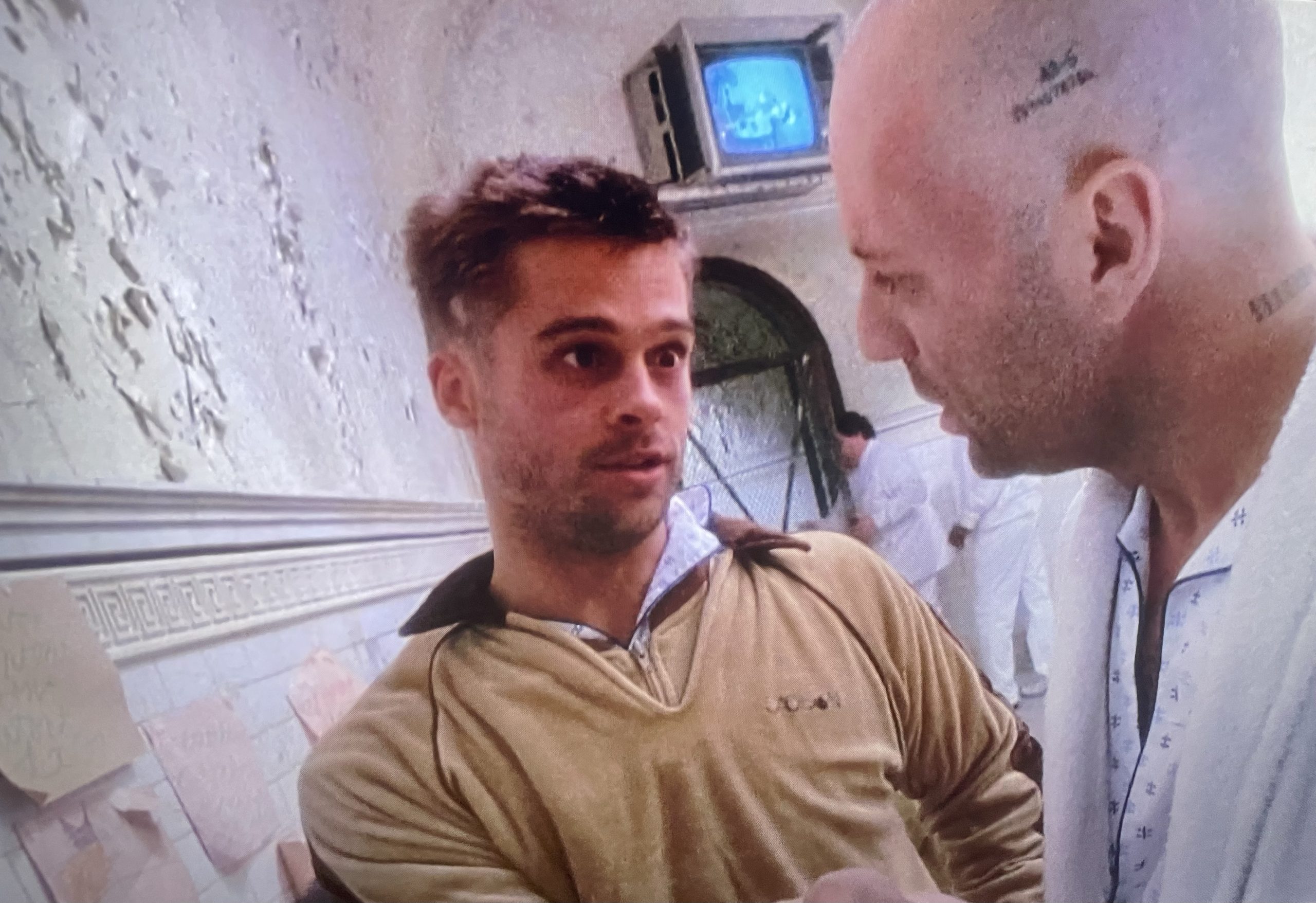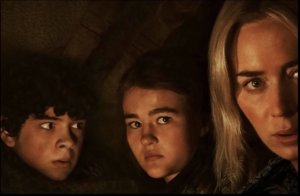Posts Tagged ‘amazon’
12 MONKEYS A No-Spoiler Review
My son is visiting Wisconsin and after work, we are alternatingly choosing films to watch together. Two nights ago, we watched a horror flick he chose called Hereditary, which was decent, not awesome, but was made by the same film company that produced Ex Machina(which I loved and realizing now, I have never reviewed this flick on my site…must amend).
Last night, we watched 12 MONKEYS on Amazon Prime for $3.99. This film would probably be rated PG-13 today. No sexual content really, just creepy apocalyptic tension. And wow! This is still an awesome film and has aged well. Today, I asked my GenZ kid…What do you think? Would most GenZers like this film?
He said.
Absolutely. Yes.
It’s been a while since I’ve watched 12 MONKEYS, but given my vague memory of it, I thought…might be worth the time.
One pleasure, as an older film fan, was to remember Bruce Willis and Brad Pitt remarkably in the same film. Not sure it happened in any other, but what Terry Gilliam delivered on the screen between these two, was close to perfection. This is possibly Brad Pitt’s finest acting and if you’re a fan, you’re gonna have to watch. A few images below underlie my point.
First, my Short Review: 4 Reasons You Want to Watch 12 MONKEYS
- Weird and dystopian tale, echoing Blade Runner in tone and style.
- One of Terry Gilliam’s masterpieces
- Possibly Brad Pitt’s finest acting
- Bruce Willis playing his iconic gritty and misunderstood character
- Great storytelling
Just cannot get enough of these scenes, shots of these two iconic men, culture-impacting actors for the last 30 years.
And
The Longer Review
Sometimes when you re-watch a film like 12 MONKEYS, you wonder how it’s gonna age. As an older person, you think (because you have experienced this before), was I impressed because of something slightly superficial and trite, or was this film truly great? With this flick, you need not worry. 12 MONKEYS delivers on so many levels. First, it delivers on weirdness of setting, including its gritty urban reality. My son (25yo), who has watched Blade Runner understood the dystopian aesthetic of this world. He even commented on the similarity. That, in and of itself, makes me feel I am doing my job training up my children. Second, 12 MONKEYS delivers on story. There is a clear protagonist, a vaguely enormous villain (that proves to be more personal in the final scenes) and enough mystery to keep the audience in tension. Finally, there is weirdness and surprise and the best aspects of science fiction where the perspective being put forward from one or two of the characters absolutely blows up the assumptions and values of the audience. And, if nothing else, respect these images…bizarre and gorgeous. Terry Gilliam is a genius.
A QUIET PLACE II, A No-Spoiler Review
Worthy of a trip to the movie theater. I say yes!
A QUIET PLACE II was the first film I watched in a theater after receiving the COVID vaccine. It was a joyous occasion on many levels and worth a trip to the theater. The suspense and scare moments are best viewed when in a large, dark room, alongside a bunch of others who will scream in unison with you. We ventured into a theater in Madison, Wisconsin last night, our mask mandate having been lifted the day before. (Dane County has one of the highest vaccination rates in the country).
Here are 5 reasons this film is worth the price of the ticket:
- This is true scifi (in the spirit of Ridley Scott’s Alien, AKA monster versus human)
- The storytelling is intimate in the best possible way, focusing on one family scrambling to survive in a nearly impossible world
- Jump out of your seat moments, but without the extreme gore often found in the horror genre
- A longer story arc that builds tension and keeps the audience longing for more
- A dynamic deaf actress who plays a deaf character. An amazing role and an amazing performance by Millicent Simmonds
A QUIET PLACE II is rated PG-13. Mature teens could handle this if they like horror. Again…this is not gory horror, but it will likely give little tykes nightmares.
I must say, the group of us were giddy and joyful to be walking into the theater again after so many months of Netflix and Amazon Prime and Disney Plus, etc, etc, viewing by ourselves in our little hovels. The theater felt glorious and expansive.
Some economists ponder whether or not the movie theater will die as a result of our streaming habits (already in process before Covid). If last night is any indication, I would say no. Some films need to be viewed in community, and in a massive, dark space.
A QUIET PLACE II did not disappoint.
All of us in our party had see the first installment. All of us had been pleasantly surprised with the quality of the story in that first film. Always suspecting the sequel will be lame, we didn’t venture into the theaters until we heard from critics and viewers that this second film was both consistent with the vibe of the first (did not lose its heart) yet deepened the overall tension. A third installment is being shot as I write.
I highly recommend you view the first film before going to the second. Here is my review of A QUIET PLACE
You can rent this first film on Amazon Prime for $3.99.
After which I highly recommend you view the second film and be prepared for a few jump-out-of-your-seat moments and a wonderful theater experience overall.
TRAIN TO BUSAN, A No Spoiler Review
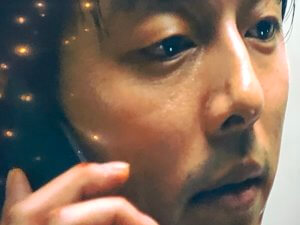
TRAIN TO BUSAN, set in Korea, is subtitled for English (and other language) speakers. This film was written for the screen by Sang-Ho Yeon and Joo-Suk Park and directed by Yeon. The film would probably receive a PG-13 rating for gore, the zombie kind, nothing worse that what you might see on AMC’s The Walking Dead. You can view this film for free if you are an Amazon Prime member. I loved it. In fact, I think the writing is brilliant.
Click here for the film’s trailer.
 Short Review. Five reasons I highly recommend TRAIN TO BUSAN
Short Review. Five reasons I highly recommend TRAIN TO BUSAN
- Perfect writing/storytelling, including the pacing that ramps up quickly at about 10 minutes in
- Sympathetic characters. The father/daughter story at the heart puts this zombie flick in a category above most others
- Another fresh setting. By now, if you’ve read a few of my reviews, you know I am an advocate of consuming stories told outside of the Hollywood bubble
- Once the action starts, it doesn’t stop and much of it takes place in the close confines of a train or a train station
- A pitch-perfect ending
Longer Review
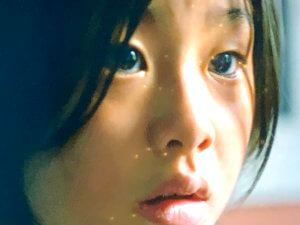
Seok-woo, a divorced father of one 10yo (or so) daughter, Soo-an, is a fund manager who works long hours. While he works, his mother cares for his daughter. They are based in Seoul, Korea. On the day the audience meets this family (the first minutes of the film), Soo-an is anticipating her birthday on the following day. She longs to be with her mother on her birthday. The problem, her mother lives in Busan, so Seok-woo must decide if he will accompany his daughter to Busan during a time when he is overwhelmed with work. He decides he will. In the first minutes, the audience has learned he has NOT been the most attentive father due to his demanding job. Is it guilt or something else that urges him to make this decision?
The decision is a sacrifice from his perspective, though he assumes he will be able to go very early in the morning, deposit his daughter in Busan and still return to Seoul to work a half day. The train trip (normally) is about 3 hours.
However, as they embark on the journey, a few unusual situations emerge, scenes the audience anticipates and knows are signs of something gone wrong.
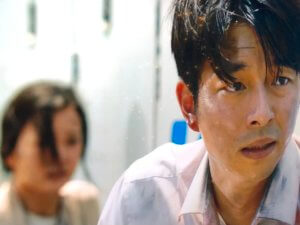
The rest of the narrative is not a simple zombie story. Seok-woo must fight and learn to sacrifice, not just for his daughter, but for others. While he journeys, he will have many teachers, including his daughter. Amid all the stress, he grows and changes.
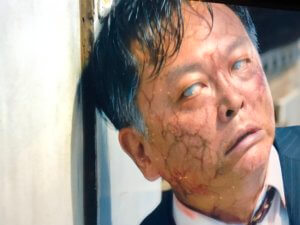
EQUILIBRIUM, A No Spoiler Review
During COVID, I have been watching older science fiction films, whose theatrical release I might have missed. EQUILIBRIUM falls into that category. Written and directed by Kurt Wimmer, starring Christian Bale, Sean Bean, Taye Diggs and Emily Watson, this film is rated R for violence, released in 2002. You can rent it as an Amazon Prime member for 4 dollars.
I recommend this film. It’s not the most thoughtful science fiction around, but it was entertaining on a few levels.
Short Review, 4 Reasons to watch
- Christian Bale gives a nice performance
- The one idea that drives the plot does create tension and makes the audience think at least a little…(see longer review)
- Stylized fight scenes–if you like martial arts/Matrix type battles
- Tight, linear story…easy to follow (given I just watched Tenet in the theater, it’s nice to watch a film that is relatively straightforward)
Longer Review
Earth exists in a dystopian reality, post WWIII, led by a man the population calls Father, though the ruling powers are likely something broader than one man. These decision makers have determined that Earth will not make it through another world war and have created a rigid society for the sake of survival. Emotion is outlawed, so are all things associated with emotion, in the film’s case: art, music, nostalgia items, love/affection, sensual pleasure, pets. The ruling class gives the population a drug to dampen emotions. Most faithfully take their doses a few times a day, including Bale’s character, John Preston. Preston is called a cleric, which the audience learns is a highly trained enforcer of the government’s anti-emotion policy. He roots out the rebels and those who indulge in art of all types.
The incident that brings upheaval into Preston’s life is when his partner Partridge, played by Sean Bean, steals a poetry book they had confiscated. Preston confronts him when he catches Partridge reading Yeats for his own pleasure. He is sentenced to death, but not before he reads a few lines of poetry out loud. Soon after, Preston discovers Patridge’s lover, played by Emily Watson. When he realizes that his former partner had gone down this road toward emotions, even falling in love…it seems, he cannot go back….something in him is triggered.
The unraveling continues as Preston dreams and recalls his wife’s conviction and execution. She was caught “feeling” outside the bounds of what the society permitted. His son is a rigid rule keeper, but his daughter is obviously more emotional and possibly disturbed (who wouldn’t be in this world?). Preston stops taking the drug and begins to truly feel a lot more. His new partner, Brandt, played by Taye Diggs, begins to notice his odd behavior. In the meantime, the rebels begin to recruit Preston. They want him to kill Father.
There is a strange interaction between Preston and the leader of the rebels where the leader makes sure that Preston cannot allow himself to feel if he is going to do the job he needs to do. The leader also indicates that he himself buried his feelings. That raises an interesting question about feelings and soldiers who are called upon by society to perform a “justified” killing. The audience can see in this a reflection of Father’s maintenance of the population…Father has told his followers that they must not feel in order to perform righteously. I think the audience is supposed to ponder this and reflect on what it means to kill another human being (like killing the spirit of the person by outlawing art!), but the interaction does pass by pretty quickly and there is no further discussion on it. Moreover, many people die in this film, so if we’re supposed to feel horrible about murder/a crazy amount of killing…hmm…not sure.
There are almost zero female characters in EQUILIBRIUM, which begs the question…
Is a non-emotional world a place where women have a hard time existing? I suspect so, at least in this film world. All of the female characters who have significant screen time (which isn’t much) are in the rebel category. Even Mona Lisa cannot exist in this world. (Da Vinci’s masterpiece is destroyed in an early scene). I appreciated the Emily Watson character, but she is one among six guys who dominate every scene. I realize a lot of folks don’t care about this issue…but I like to contemplate…Does it have to be this way? Would this film say something deeper and broader about humanity if one of the hardcore cleric characters was a woman? Or maybe the filmmaker was showing us what a world might look like without women, without mothering, nurturing and emotional connection…and maybe without them…art could not exist. That is an interesting idea, but I don’t think this film quite got us there.
Good science fiction does often grapple with the question, what does it mean to be human? The equilibrium sought out by the government in this film, is tentative and only possible because of the numbing of the population through a constant intake of a drug. EQUILIBRIUM portrays characters who will forego taking the drug, are willing to die and choose to sacrifice all for the sake of feeling. Art, poetry, music, love, affection and warmth in relationships…we cannot be human without them. We cannot live without them.
For that reason, I found EQUILIBRIUM a hopeful picture of humanity. Love, creativity and expression will burst forth. It cannot be contained. It can never be fully squelched and is a hopeless task of any government to try to do so.
THE ANDROMEDA STRAIN, A No Spoiler Review
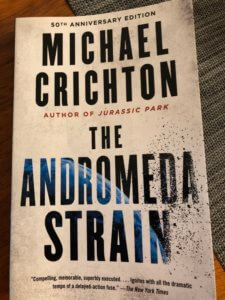
However, Crichton soon after became a best-selling author and gave up the idea of practicing medicine.
I read this novel because of a recommendation by a friend during Covid19…
Do I recommend this novel? No, I don’t and here are 5 reasons why:
- The novel puts forward an interesting premise, but not fully baked (I am pretty sure this novel would never get published today)
- Bland main characters. It’s hard to keep them straight, they all seem like the same guy (except they attended different Ivy League schools and have slightly different occupations)
- So-so tension, but nothing like one of his better books, Jurassic Park, for example
- Characters are all white dudes in lab coats and even the non lab-coat characters are all white dudes. *note…when THE ANDROMEDA STRAIN was turned into a film in 1971, the screenwriter changed one of the dudes to a female…even in the 70s the character line-up was thought to be way too monochromatic.
- Too much data and exposition and not enough heart. I felt nothing for all the people (except for the infant…who seems to be completely neglected)
Longer Review…
So…this novel became a best-seller and gave rise to a film that bears the same title. Both were hits/made a lot of money. In fact, this book catapulted Crichton’s career. I can only surmise that there was a great hunger for techno-thrillers at the time and that Crichton scratched an itch that had be itching for a long time.
The funny thing is, immediately following this read, I’m consuming Philip K. Dick’s, DO ANDROIDS DREAM OF ELECTRIC SHEEP and I am so wowed by the writing and how different it is from Crichton’s. Dick knew how to flesh out a character. Crichton did not, at least he didn’t yet. He got much better at it in subsequent novels, many of which I have enjoyed.
So, let me just nit-pick a little…
If I was ever to teach a writing class on the development of a writer…I might choose Crichton and force my class to read this book and then give them the pleasure of Jurassic Park as examples of how one gets better at the craft. THE ANDROMEDA STRAIN almost feels like a “freshman novel”, that novel written by an aspiring author who has one great idea, but can’t quite figure out how to tell the story.
In that class, I would also ask the students to read DO ANDROIDS DREAM OF ELECTRIC SHEEP, by Philip K. Dick, written in the same era.
There is a reason that BLADE RUNNER, a brilliant film and subsequent franchise, emerged out of Dick’s novel, published in 1968, one year before THE ANDROMEDA STRAIN.
The character of Rick Deckard is brilliantly written, fleshed out. The reader feels his pain, his angst, his story as he/she reads. Not only that, the secondary characters are complex, mysterious and full of emotion even when Dick writes about androids. His androids seem more human than Crichton’s actual human characters.
I do believe that Crichton saw his errors and improved immensely, but it will be a mystery to me for a long time that this book, THE ANDROMEDA STRAIN, was published and was sold and was read by so many, including me!
If for some reason you want to buy this book, click here.
To watch the film via Amazon Prime, click here.
HANNA, A Review of Amazon Prime’s TV Series

I rate this series R, mostly for its violence. HANNA, created and written by David Farr, also portrays a disturbing picture of childhood, so if you have young children/teens who want to watch, you may want to preview this before allowing them to enter into the violent world of Hanna. Other than that, I highly recommend this series. It skirts the line that is science fiction and dystopian.
Short Review of HANNA. 6 Reasons You Want to Watch…
- Well written story and well-crafted characters
- Outstanding performances by Joel Kinnaman, Mireille Enos (they’re reunited here…having starred together in the award-winning detective series, The Killing.) Hanna is played by Esme Creed-Miles. She’s a British actor, but pulled off the German accent. I don’t think she actually speaks German, but she did speak French fluently. Kinnaman is Swedish. He also carried the German accent and spoke a lot of German to make this role believable.
- Timely. A US intelligence service, broken into factions, clawing at more power? Perhaps too real…
- Truth and morality emerge in the most unlikely places and the story reminds us of that.
- I love the way the characters rarely shout. Erik (Kinneman) and Hanna (Creed-Mills) both have this quality. They speak with intensity, but always quiet and measured, understated. I found myself loving this vibe more than I thought I would, maybe my Scandinavian roots…
- A story set in Europe, especially Berlin, London and Paris. Hurray, given we cannot travel there right now.
Longer Review
One of the things I liked about this production was its willingness to go slow. That might sound weird because the story moves at a pretty fast clip, but there is also time in each episode to absorb what is taking place in the character’s lives, in their hearts. I attribute part of that pacing to the editing. THANK YOU DIRECTORS AND EDITORS! It surprised me sometimes what was not put on the screen/what was skipped, but it also revealed what was most essential for the story. I found my brain willing to allow the holes in the plot because the true drama was not withheld from my view.
In season 1, the audience is introduced to Hanna as a baby, also to her mother and to her mother’s savior, Erik (Kinneman) who ends up rescuing Hanna from destruction. Erik, though German, is an insider with the US intelligence agency that is accepting babies in order to turn them into super assassins. Erik becomes Hanna’s guardian and the audience believes he might actually be her father. He isn’t. When Hanna finds out he has lied to her about his biological relationship to her, she is enraged.
Telling the truth is VERY important to Hanna. This seems consistent throughout and is refreshing as a character trait. It grounds the viewer, even when Hanna’s allegiance to the “good” or the “evil” entities in the world seems confusing. Hanna punishes those who lie to her, even when those individuals are her allies.
That dynamic of telling truth versus lying, or shrouding the truth reminds me of how teens (I’ve raised a couple and counseled many) have a nose for truth or fiction. They sense when adults are lying to them. Just tell me the damn truth and don’t protect me from it because you think I can’t handle it said every teen ever.
And I love that about them. I loved that about Hanna. She is so pure in that sense, the audience is ready to root for her in just about any circumstance, even when it feels like she is about to give in to evil.
Hanna has been renewed for a third season. I look forward to seeing how the writers develop this story.
THE MAN IN THE HIGH CASTLE, A No Spoiler Review of the Amazon Prime TV Series

THE MAN IN THE HIGH CASTLE is not a new story, but it was imagined anew by creator Frank Spotnitz for our era. It is based on Philip K. Dick’s novel of the same name (which I have not yet read, but will soon because I enjoyed the series so much). Dick’s daughter was involved in the production of the tv version, overseeing her father’s vision.
This story is less science fiction in the traditional sense and more alternative history. Dick wrote THE MAN IN THE HIGH CASTLE after being inspired by the novel Bring the Jubilee, by Ward Moore, whose novel is an alternative history of the US where the Confederate States win the Civil War. In Dick’s novel, the Axis powers win World War II. First, the short review:
5 Reasons I Recommend THE MAN IN HIGH CASTLE

- Superb storytelling…I was surprised at how well the writer(s) kept me engaged, including the pacing over 4 seasons. Bravo!
- Spot-on performances. A brilliant portrayal of John Smith, an American/Nazi leader, by Rufus Sewell. Also, a powerful female hero in Juliana Crain (Alexa Davalos)
- A satisfying enough ending (will say no more lest I spoil)
- Pushing characters to their limits and not turning away from human dilemmas like: How far would you go to protect your family? Would you kill a person in cold blood if you know they will be responsible for death and mayhem in the future?
- Finally, if you find history a bore, consider jump-starting your learning via consuming smart fiction, like THE MAN IN THE HIGH CASTLE. World War II was a fascinating and dark time in world history with reverberations reaching into our current era, more than we might think. THE MAN IN THE HIGH CASTLE gives the audience an intimate view into the characters of the day, many of whom are real historical people, but if not real, the fictional characters help the audience understand the zeitgeist of the time.
Longer Review…

In that sense, I found the series remarkably relevant. Dick is playing with alternative histories in this story and Spotnitz (credit for the screenplay/creator goes alone to Frank Spotnitz on the show’s Wikipedia page) was able to put forward a world that in many respects, felt as real as the news I see on my screen on any given day. Before Covid19 and George Floyd protests…in this series (in the book, I assume as well) memorials, monuments and statues are blown up, taken down, destroyed. That was interesting for me to ponder.
In THE MAN IN THE HIGH CASTLE, those taking down the monuments are Nazis, determined to wipe out American history and recreate their own version of history that will be imposed on Americans. One character spells out the reason, “Once we wipe out their narrative, it will help them accept our narrative, the Nazi narrative.” The Nazis empower the young people in the US to riot and do violence to any who try to protect the monuments.
I would hesitate to make a moral statement about those who have defaced monuments in our cities in these last months, but I did find it fascinating to see this portrayal, non political, I assume because the screenplay was written long before our recent protests. How would those scenes be written today? I wonder…
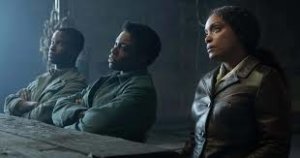
THE MAN IN THE HIGH CASTLE does not justify white supremacy. It tries, I think, to highlight its evil and does not let white America off the hook. Like I said…this is a complex narrative and, to give Dick credit, it was written in the early 1960s.
In the series, the Axis powers have split the US into three zones. The Japanese rule that which is West of Rockies. The East is ruled by the Nazis and in an attempt to keep these powers from eating each other, the middle of the US is neutral. Juliana Crain is a San Francisco native, so plenty of Northern California sites on screen, including the supremely gorgeous Japanese Tea Garden in Golden Gate Park.

Grit, hope, despair and horrible evil are all captured in this story, but what emerges most prominently in narrative are deep truths about what is right, just and good. This story is one for our time. I encourage you to start watching today.
DARK/WEB, Chapter 8 A Final Review with a Few Minor Spoilers
My 8th post on this particular Amazon Prime series. I reviewed chapter by chapter (episodes are called chapters). For a review of the pilot, click Chapter 1.
Today I viewed the finale.
Question that arose…Will DARK/WEB will have a second season? Will there be enough interest? I have no way of knowing. What I can say is this…
There is a kind of resolution that takes place in this final chapter.
- Molly is found
- The mystery of what she was up to and why she was drawing her friends toward her hiding place is solved
- There are a couple of big reveals…one of which doesn’t pack the emotional punch that it should
- A perhaps too tidy wrap-up
- More horror story tropes…like a corpse, a cabin in the woods, a stormy night without power
The ending to this series felt overly ambitious and contrived…a lot of explaining right at the end to tie up all of the loose ends. Sometimes the characters acted in a way that didn’t make sense to me, didn’t see human, but served the overall plot. I always get frustrated when this is the case. There is a campy nature to the series, maybe this is part of the fun…perhaps another horror trope? However, it also takes itself VERY seriously at times, so I was trying to take it seriously too and sometimes the camp did not match the tone of true evil that was being portrayed.
However, I will give the series lots of chops for these elements:
- An ambitious vision in its attempt to unveil evil in our society
- A diverse cast of characters, (diverse in ethnicity and sexual orientation)
- A female POC director. I loved the direction overall…I wasn’t wild about the all the writing, but hey…I am a writer and am always more picky about the writing than the directing.
Overall, I recommend DARK/WEB if you have the stomach to watch horror/scifi.
DARK/WEB, Chapter 7 Minor Spoilers
7th and Penultimate Chapter. My 7th review in 7 days.
This review will contain spoilers for earlier episodes and minor spoilers for this episode (episodes are called Chapters), so be warned. Go back to menu or click PILOT if you want to read an introduction to the series.
I’ll say a little about the structure of the series at this point.
- Short stories, written by Molly are clues that will help her friends find her. All of the stories are dramatized on screen. This image, for example, is from one of the Molly’s stories called Viral. Nearly every chapter features one of Molly’s stories. About 15 minutes of screentime in Chapter 7 puts the audience in the world of Viral.
- All of Molly’s stories are dark, some are pure horror and very gruesome. I almost stopped watching this series after Chapter 2 because of it. Kim Rider, who has read all or most of Molly’s stories as they were online dating, says that Molly uses stories to work out the darkness in her own life.
- There are a variety of interesting filming techniques in DARK/WEB. I’ll highlight one. Notice the image posted above with words across the character’s face. These are words of a screenplay being typed by this particular film student, as she sits at her computer. She is the main character in Viral. This view through the computer into the scene has been used throughout the series and gives that creepy feeling that someone is watching from inside or beyond our screens. The audience sees what is taking place, but the characters don’t and we don’t know who is watching…that is unnerving and puts the audience on edge, exactly what the story creators want.
- Viral is a story about cyberbullying. The audience understands that unfortunately, cyberbullying takes place in real life. This story may be fictional, but it hits close enough to home to bring about reflections of human cruelty and evil, evil that exists in seemingly normal, everyday people. Looking at cyberbullying headon is horrific and not everyone’s cup of tea. As I indicated above, I almost stopped watching after chapter 2. Viral was also hard to watch.
The story creators of DARK/WEB have given their series this title for a reason. It is documented that the secret and more anonymous world of the dark web exists and exhibits the worst side of humanity. If you are squeamish or needing something more uplifting as entertainment, please be warned. We all know that there are many good people in our world (and that even the “evil” people have potential for redemption…at least I believe that) and most of us hope that the good will ultimately triumph over evil by the tale’s end. We will see…
DARK/WEB Chapter 6, No Spoiler Review
6th post in 6 days…
Major backstory episode for the larger story arc, which I appreciated. It was the right time to give the audience more reveals. This review will have spoilers of the previous Chapters. For an introduction to the series and no spoilers, click the Pilot.
Pictured is Zach Sullivan before he has his mental break. In chapter 4, he is visited by Ethan in the mental hospital, so the audience meets him well after this scene with Molly. One suspects something bad went down at the job because in the hospital, he freaks out when a phone is brought near him. He and Molly were colleagues at Citadel, the computer/systems security company. Somehow, all roads are leading to Citadel…or are they?
Molly and Zach rely on one another for help with coding (actually…Molly may be the smarter of the two, though Zach has been at the company longer). As they lunch together at work, Zach and another coder tell Molly about Citadel’s secret project called MIHR. Zach is applying for a new job in the company and is hoping he will make the MIHR team.
Zach does get promoted and he does write code related to MIHR. He also stops having friendly lunches with Molly and appears exhausted and unkempt. Eventually, when Zach needs her help in solving another coding issue, she and we encounter MIHR.
This chapter is not gruesome and gives the audience a chance to know Molly better, the character at the center of the mystery.

